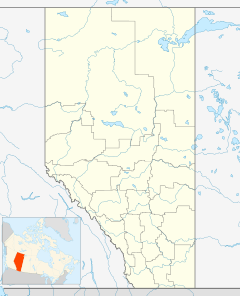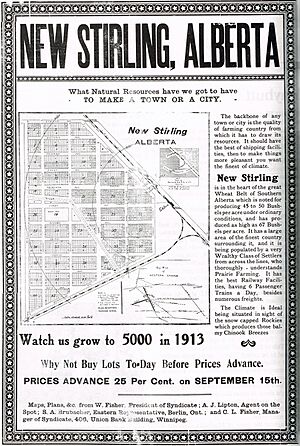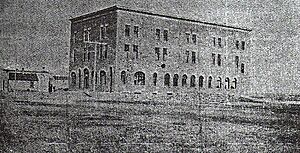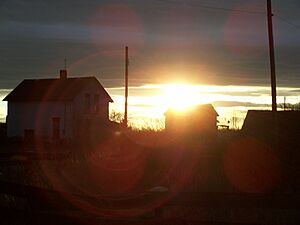Maybutt, Alberta facts for kids
Quick facts for kids
Maybutt
|
|
|---|---|
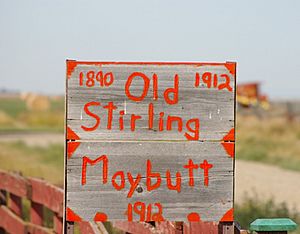 |
|
| Nickname(s):
The Junction Town (1912)
|
|
| Country | Canada |
| Province | Alberta |
| Region | Southern Alberta |
| Census division | 2 |
| Municipal district | County of Warner No. 5 |
| Founded | 1910 |
| Elevation | 935 m (3,068 ft) |
| Time zone | UTC−7 (MST) |
| • Summer (DST) | UTC−6 (MDT) |
| Postal code span |
TOK 2EO
|
| Area code(s) | +1-403 |
| Highways | Highway 4 Highway 61 |
| Waterways | Etzikom Coulee Kipp Coulee Stirling Lake Milk River Ridge Reservoir |
Maybutt, also called "New Stirling" or "New Town," was once a small community in Alberta, Canada. It's located just 1 kilometer north of Stirling. It sits along a major road between Lethbridge and the US border. Today, many people who work in Lethbridge live in Maybutt. Newer homes are being built in the area. The old streets of Maybutt include York Street, First Avenue, and Second Avenue.
Only a few original buildings remain in Maybutt. One is a brick home built around 1910 on Second Avenue. Another is the Alberta Wheat Pool residence. The old Ellison grain elevator from 1922 is still there. It was changed a lot after a fire in 2013.
Contents
History of Maybutt
Early Beginnings in 1899
On May 5, 1899, Theodore Brandley and other Latter Day Saint settlers arrived near what is now Maybutt. They helped create the community of Stirling, which is 1 kilometer south of Maybutt.
The Railroad and a New Town in 1909
Around 1909-1910, the Canadian Pacific Railway (CPR) planned to expand its lines. They needed a new junction point (a place where train tracks meet). This new junction was built in an ideal spot for a new community.
A real estate promoter named William Fisher saw this opportunity. He started "The Stirling Townsite Syndicate" and created a new community called New Stirling. Mr. Fisher bought many land lots and advertised the new hamlet widely. Some posters even claimed the town would grow to 5,000 people by 1913. They showed a lake with yachts, even though it was a smelly marsh!
The Prairie Queen Hotel
Mr. Fisher had big plans for New Stirling. He wanted to build a large hotel called the Prairie Queen. It was a beautiful three-story brick hotel with modern features like steam heat and electric lights. It even had a bar room that was never used as a bar. When it was finished, the Prairie Queen was said to be the largest hotel built in a new community west of Winnipeg.
The Boom Years: 1910-1920
From 1910 to 1920, New Stirling grew and became very successful. It had over 100 residents and many people from nearby farms supported it. The community had many services, like its own newspaper, The New Stirling Star.
Other businesses included:
- Stables for horses
- A bank (Union Bank of Canada)
- A two-story boarding house
- Two general stores
- Lumber yards
- Three grain elevators and a flour mill
- A Presbyterian and later United Church
- Homes for railway workers
- A honey factory
- A warehouse
- A Chinese laundry and restaurant
- A resident North-West Mounted Police officer
- An International Harvest Machine Company
- The large Prairie Queen Hotel
Fisher also planned to add an opera house and a new school. However, these plans never happened.
Renaming the Town in 1912
By 1912, there was confusion between the post office in "Old Town" Stirling and "New Town" Stirling. So, Fisher decided to rename New Stirling. He combined his wife's first and maiden names, "May" and "Butt," to create the name Maybutt.
The Decline of Maybutt
Starting in the mid-1920s, Maybutt faced tough times. Poor crop yields, droughts, and falling grain prices hit the community hard. This was part of the Dust Bowl era. Many residents left Maybutt and Stirling to find work elsewhere. Some even moved their homes and businesses.
The grand Prairie Queen Hotel changed owners many times. By 1918, it was being taken apart. Later, it was made into a two-story building and used as a bank. The school that was never built meant children from Maybutt had to go to school in Stirling starting in 1924. In 1932, the hotel was taken down completely. Its materials were used to build a grocery store and pool hall in Magrath.
By the end of the 1930s, only a few people lived in Maybutt. By 1960, only a service station, grain elevators, and a few homes remained. The post office and service station closed soon after. On July 30, 1970, Maybutt officially lost its status as a hamlet. It became an unincorporated place under the County of Warner No. 5.
The old Ellison elevator was sold in 1973 for private grain storage. The 1910 Taylor Milling elevator was torn down that same year. The Alberta Wheat Pool (AWP) was the last business. Its successor, Agricore United, built a new, larger elevator. The original 1928 AWP elevator was then torn down in 1998.
Maybutt School History
Classes for Maybutt children were held in different places. These included the Presbyterian Church, a Chinese restaurant, and later the Prairie Queen Hotel. Plans for a proper school building never happened. So, starting in 1924, children from Maybutt were bused to the nearby town of Stirling for school.
Media and Maybutt
Maybutt is covered by local newspapers like the Westwind Weekly and Lethbridge Herald. In its early days, New Stirling had its own newspaper called The New Stirling Star. It shared news with residents of Maybutt and Stirling. However, as the population dropped, the newspaper eventually stopped publishing.
In 1980, Stirling and Maybutt were also used for filming. The movie Pure Escape, starring James Garner, was filmed there.
Notable Residents
- Walter Gedrasik was a soldier from Maybutt. He served in the Canadian military during World War II. He died in action in Italy on October 23, 1944, when he was only 18 years old. He was awarded several medals for his service. His family received a special Memorial Cross in his honor. He is buried in Italy.
 | Jackie Robinson |
 | Jack Johnson |
 | Althea Gibson |
 | Arthur Ashe |
 | Muhammad Ali |


